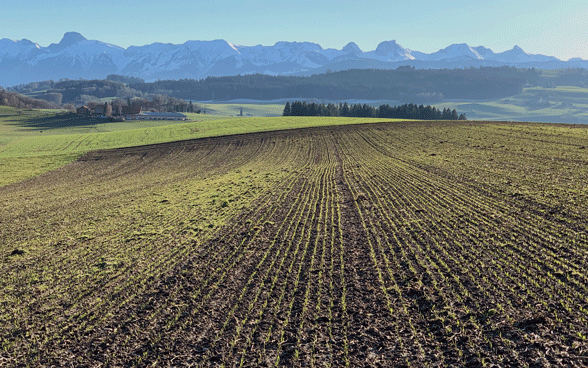On 8 May 2020, the Federal Council adopted the Swiss Soil Strategy. This strategy provides a guiding framework so that future generations are also able to benefit from the diverse services that soil provides.

Both ecologically and economically, soil is a valuable, non-renewable resource. They fulfill numerous functions and provide vital services for society - for example, in food production, as filters in the production of drinking water or, in connection with climate change, as storage reservoirs for CO2 and water. The current management of soils is not sustainable: they are being destroyed by construction activity or are degraded by erosion, compaction and pollutants.
The soil strategy adopted by the Federal Council aims to ensure that soils remain fertile in the future and can continue to perform their services for society and the economy.
The National Soil Strategy pursues six overarching objectives:
- Reduce soil consumption
The objective is that, from 2050 onwards, net soil use in Switzerland will be zero. It will still be possible to build on soil, but if this results in functions being lost, they must be offset elsewhere by improving the soil at that site.
- Manage soil consumption on the basis of an overall perspective
Soil functions are factored into planning, and the associated balancing of interests, so that soil consumption can be managed in the interests of sustainable development. The soil data required to do so is available.
- Protect soil from harmful impacts
Soil use does not result in any physical, chemical or biological impacts that might result in a lasting degradation of soil functions and thus soil fertility. Soil use takes account of its current condition and sensitivity, so that ecological soil functions and thus soil fertility are preserved.
- Restore degraded soils
Where possible and reasonable, degraded soils are restored and improved so that they are once again able to fulfil the functions typical of their site, and that their fertility is reinstated.
- Improve awareness of the value and sensitivity of soil
Soil is seen as a valuable, sensitive and finite basis of existence, so that action surrounding sustainable soil management finds the necessary level of acceptance.
- Strengthen international commitment
Switzerland’s economic and social well-being depends not only on its own soil, but also on the preservation of soils abroad. Switzerland is thus an advocate for sustainable soil management at the global level.
Further informations
Last modification 02.05.2023






